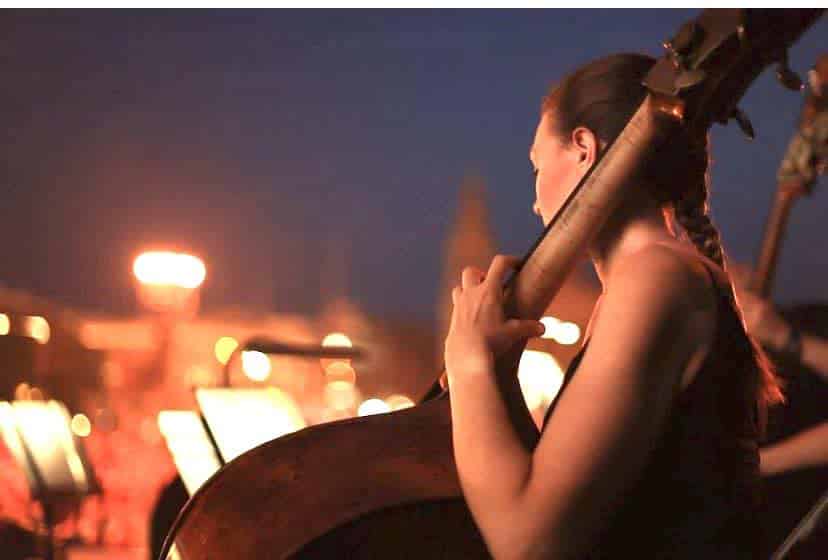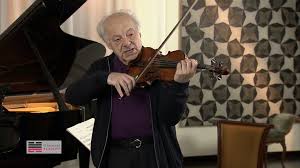Chopin Competition ‘is tilted towards Asia’
NewsAn interesting article on Nikkei Asia points out that the Chopin admits a far higher proportion of Asian contestants than other competitions.
The article is by Mari Yoshihara, professor of American studies at the University of Hawaii at Manoa. She writes:
…Musicians of Asian descent comprised half of the top prize winners …
This year, 55 out of the 87 contestants who were selected to take part in the Chopin competition were Asian, somewhat higher than in other recent piano competitions. For instance, in the Queen Elisabeth International Music Competition held in Brussels earlier this year, 26 out of the 58 pianists were Asian, and in the Leeds International Piano Competition in the U.K., Asians comprised 27 out of the 62 contestants.
There is a widespread perception that Asians are “overrepresented” in classical music. Indeed, many music conservatories and music departments today simply would not survive without Asian, especially Chinese, students….
However, it is also important to recognize the longer history and broader landscape of migration and intercultural contact that have made the classical music scene what it is today. Both in the Chopin Competition and in the classical music world generally, for many musicians the country of birth is not the same as the country of their upbringing, musical training or current residence.
Moreover, a number of “Asian musicians” are those whose parents or ancestors immigrated to the U.S., Canada or Europe in search of better livelihood, to attain education, or fleeing war or political persecution. There are also musicians with mixed heritage. Many musicians born and raised in Asia have left home to pursue advanced musical studies — Sorita, for instance, has studied in Russia and Poland, Kobayashi in the U.S. — while also maintaining personal connections and professional activities at home. Many musicians from Russia and Europe have just as complex backgrounds, trajectories and identifications.
All of this illustrates that classical music — often considered the epitome of Western high art — is not an enclosed province of European culture. What is understood today as “classical music” originated in 18th-century Europe and developed through the growth of bourgeois society and industrialization in the 19th century….

Read the full article here.






Many years ago most contestants were Russians-that is from the former USSR.
Dare I say that they were of better musical quality?
“Dare I say that they were of better musical quality?”
Quite possible – they’d been “at it” for longer.
No, you may not.
They must CANCEL this display of racism immediately!
Teaching on the faculty of a highly-regarded American liberal-arts college, I can report that almost no one is majoring in music these days. (Conservatories are another story, of course.) Of my piano students during the last quarter century, typically 70% or more are students from Asia (China, Korea, Japan, and – more recently – Vietnam) or first-generation Asian-American. While a small sample, this points to a remarkable demographic shift and suggests that the future of European classical music will be in Asia.
“and suggests that the future of European classical music will be in Asia.”
Well that’s not too bad, in my opinion, so long as it has a future somewhere. Perhaps it will be “re-imported” at some point in the (distant?) future.
SE Asia can teach us a lot about education, and attitudes towards it.
Reminds me of who was responsible for preserving culture, math, etc. during the Middle/Dark Ages.
I’m cheering that from the roof-tops because the art music I love will exist in perpetuity – something I don’t feel could be guaranteed in the “European world” where Beethoven now represents ‘white privilege’.
If we don’t want it doesn’t mean somebody else won’t have it!! And value it.
Disagree. Just look at any large state university (University of Michigan, Ohio State, etc.). You’ll see that Music Education majors make up probably the largest proportion of the music department.
Utter bullshit!! Name one decent musician coming out of UoM or OS. None! “Largest” does not mean the best. America is large, but this is where it ENDS!
And even that will probably not last long.
It is surely no secret that parents in Asia, particularly China, wish their children to win competitions and gain acceptance to prestigious music schools. They have the means necessary to afford daily private lessons and additional support from practice coaches to supplement private teachers. One architect colleague of mine (whose daughter graduated from a famous school in the US) told me young violin students have coaches simply for daily intonation practice next to a keyboard.
Should there be any shock that not only are there more students per capita learning music but that the approach to learning music has embedded in it a competitive sports-like nature, and that students who have been trained note by note have acquired an ability to sustain focus through the demands of a competition?
This is what has happened: The world of music has turned to the East, particularly China, but the Old World must be ready for this markedly different approach.
This is not to suggest there is only manufactured talent. That is not really the case, but the proportions of those who study music seriously vs the number who are accepted into competitions is not remotely comparable to the same ratio of those in the West. There are literally millions of serious piano students in China alone—Gramophon magazine estimated in 2007: 70,000,000.
How many in Poland or France?
Yet….
That said, the winner however doesn’t seem to quite belong to the East Asia tiger parents camp, which tends to ask 5yo practice 6 hrs a day. To me he is pretty much a multicultural/tri-lingual kid that absorbs positive doctrines from both east and west. Reminding me of the new US open champion Emma that seems to handle the identity extremely well and easily a sponsor’s darling for obvious reason.
I find it very hard to believe that 5% of the total Chinese population would study piano at the moment. According to Wikipedia, there were 11 million post-secondary school students in China.
Maybe Gramophone magazine means 70 million Chinese people who play the piano?
Perhaps the winner of the Chopin competition is just, simply… TALENTED
Talent in music is nothing without good guidance and consistent hard work; parents+teachers are critical in the early years, as well as funding and time.
Talent isn’t a term typically applied to players over 18–at least it would be silly to use.
“Martha Argerich plays so well, darling. She’s talented.”
“That Horowitz was one helluva pianist. He was super talented.”
“Look, it’s Yuja Wang! Her piano playing is so good. She’s talented.”
“Wow, look at this video of Hilary Hahn when she was 7. Man, she was talented”
“Yeah, and she had a solid Russian teacher and devoted parents. I wonder if she’d have played that well without the good teacher.”
I rest my case.
Ask his teacher who was in the jury and who had N.6 too among his students
A coincidence of talented celebrated by the CBC that to boot extolled the high level of the competition
Most of them had teachers in the jury! This is the trick! A trick of most, if not all competitions.
….just, simply… TALENTED…. if that much!! A grey mouse!
Bruce Liu, the winner of the Chopin Competition is a MAJOR talent!
Not only does he have a phenomenal technique, he has incredible musicianship, attention to nuances, massive dynamic range and sensitivity.
I wouldn’t be ecstatic about him if he is just another robotic note-perfect virtuoso.
With respect to Cho, I prefer Bruce Liu over him because of Liu’s artistry and attention to pathos..
On top of Bruce’s incredible artistry and musicianship, is the making of a modern era Franz Liszt!
The scores from stage 1 to Stage 3 showed a massive lead for Bruce before the Concerto!
Here are the scores after stage 1-3 was finished…
69.25 ….. Liu
65.82 …. Gadjiev
65.71 ….Bui
64.26 …Aimi
63.47…Sorita
63.1 …Eva
62.2 …Leonora
62.19 …Rao
61.14 ….Garcia
59.59 …Lee
64.87 …Jakab
60.39 … Kamil
So Garcia was in 9th place before the Concerto!!
I do not see the phrase “is tilted toward Asia”, which you quoted in the headline, anywhere in the linked article. Exactly who are you quoting?
I for one also noticed that there is a bit of bias against Asians or Chinese musicians in Norman. In the way he selects evaluative or leading words when all is needed is to merely describe a fact or a neural statement. I am glad the comments on this post have been very fact based and calm. If we believe that classical music, arts and overall culture are features of the human race, how does it matter whether eastern or western, winning or losing?
Asia has a great classical music scene. They don’t have critics and a tiny portion of their audience constantly screaming for more imaginative programming and diversity. Just the music, no politics.
Mostly the politics are so threatening that they better be unmentioned.
So what? I don’t give a hoot if musicians are American, British, German, Russian, Chinese, or Lower Slobbovian. The only thing that matters is whether they can play and interpret the music. This is now an international art form, like it or not.
The bagpipe players of Upper Slobbovia are world-famous for their ambouchure, those of Lower Slobbovia however struggle with breathing problems and the lack of music paper. There are no pianists in both Slobbovias, because the piano is considered a malevolent contraption with anaspeptic dangers.
A Blackadder fan!
We live in a Global Society. To speak of music as some kind of activity which has boundaries by nationality and culture is so out-dated. It makes no difference where the music comes from, as long a it is well done and beautifully interpreted. Music is made by HUMAN BEINGS! To argue about performance it in terms of race or nationality is, in a way, bigoted, and, soooo last Century.
Entirely true.
In fact, it has always been true, look at the way music moved around through Europe in 16th, 17th, 18th centuries. Only in the 19th century there was a more nationalistic drive which was not political but artistic: looking for local sources.
I’m wondering when the individual jury marks are published. According to their website, it should be published. https://chopin2020.pl/en/news/article/436/chopin-competition-laurels
Ha Ha!!! Not so fast!
I can see that the VIII Chopin Warsaw competition will not be past until at least a controversy has been fostered, or, better for the conspiracists, a full-blown scandal. Muckraking pure and simple in this case. Yes, there have been utterly corrupted competitions, but these attempts to make something out of bugger all is distasteful and smacks of the Mail, Sun, Evening Standard, and Kelvin Mackenzie. Stick to the real problems and issues.
And this is precisely the reason that American universities applied quotas to Asian students! They’re waaaaaaysist.
An interesting article Norman. To the casual observer- it would indeed seem a high representation of Asian contestants in the recent Chopin Prize & most other similar events- I’m reluctant to use the word ‘over’ which has rather darker inferences. Factually- Asians have always done well in international Piano Concours since WW2. At one time- Russians won all of them with a sprinkling of Americans, Italians & Hungarians (not so much now for various reasons). In my limited teaching capacities- I can only attest that the Asian pupils work hardest, have a real desire to do well at music & consistently get the best results. That’s not to say there are loads of kids in the UK who play the piano very well but are severely let down by a lack of infrastructure/investment, not enough exposure to high quality instruments (some private schools do have deals with leading manufacturers like Steinway but electronic variants seem to be the norm in schools & they’re mostly deficient for keyboard touch with a few exceptions) Plus poor teaching- although there are good & bad teachers everywhere- so a difficult one to quantify. By the level of conservatoire, competitions or professional work- Asians are simply better equipped through good training & an exposure to a wider musical culture. In the UK- there’s a wide spread impression that you just play the piano for a bit of fun & if you play well enough- you can entertain friends/family at home or play in a bar for a bit of pocket money on the side- which is fair enough. The top of the piano world is miniscule- about half a dozen players in each generation who capture the public’s imagination (most competition laureates don’t in the long term after the first flush of success) I think it was Bryce Morrison- the distinguished piano guru/critic- who summed it up well saying that ‘the world doesn’t need pianists- it needs accountants & lawyers’. Good point- but playing the piano well is a great gift to yourself & others & maybe more needs to be done to support the young talent which is getting lost. I imagine that there are far better pedagogues than me to offer an assessment.
The old canard about musicians from Asia and the Far East possessing phenomenal technical skills but lacking in musical understanding of what is essentially a Western art form seems, on the evidence of this year’s Chopin Competition to be well and truly buried. I cannot recall pianism at this exalted level nor any sense that the interpretative gestures are imitative rather than experienced. Dazzling in every respect.
There were NO “dazzling” performances at all. You want dazzling Chopin?!? Friedman, Rosenthal, Horowitz, Cortot, Hoffman, Rachmaninoff, Busoni, Michelangeli, Pletnev — now that IS DAZZLING! “Chopin 2021” is nothing compared to any of the above mentioned!
Romantic nostalgia.
I totally disagree with you! And stop living in the past!
All one has to do is to compare Pollini and Argerich’s winning Chopin performances to Bruce’s. And you’ll realize that Bruce is at or above their levels.
And note that when Rachmaninoff wrote the Rach3, only a handful of pianists can do it justice( mainly Horowitz 1931).
Today, there’re about a dozen of pianists who can play it extremely well.
Time now for someone to claim that Chopin was black! And surely anyone playing Chopin other than young Polish men, preferably suffering form TB, is guilty of Cultural Appropriation and should be shut down immediately.
A lot of the keys on a piano are black. What I want to know is what is going to be done about this and whether studies have shown HOW those black keys are exploited in power dynamics associated with tonality.
Absolutely! Chopin can be played only by blacks and browns, and definitely dying of TB + Covid-19 for a “modern touch”!
..from TB, I meant…
TB, or not TB, that is the question.
Maybe the students are made to work harder and longer.
The hours that Lang Lang was made to prw rice as a small child would’ve have been considered child abuse in the West.
Piano competition is international. If Asians make up 59+% of the world population, I would say right now Asian is still underrepresented. I wonder when such competitions were overwhelmingly Caucasian (esp. Russian)-dominated, the word overrepresentation ever came up?
ditto!!
Actually, affirmative action for a piano Competition is ridiculous!
We want the best pianists for their talents, NOT ethnicity or nationality!
Imagine if they insist a portion of the Lakers are Asians for the sake of diversity, lol…
European classical music, the traditional art music of the contiment, is universal in nature. It is accessible to anybody with enough perception, and for players, with enough talents and supporting circumstances. So, it belongs to the world at large.
“….. the Chopin Competition, which celebrates the works of Chopin as the preeminent embodiment of Polish culture.” I never hear Chopin’s music as ‘Polish’ but as European with a French veneer; the folky pieces of Mazurka and Polonaise are, to my ears, as ‘Polish’ as the Havanaise of Saint-Saëns is ‘Spanish’, or Debussy’s Iberia is ‘Spanish’. Bartok’s ‘Hungarian’ music is only Hungarian in so far as it draws upon some folk music sources, but the result is European art music. How ‘Russian’ is Chaikovsky? It’s all fantasy anyway… fortunately.
As for the East Asians: much more worrying than an imagined ‘threat’ of Chinese ‘taking over classical music’ is the spoiled indifference of Western societies who, instead of cultivating one of their greatest assets, burden it with absurd and ignorant accusations of elitism, white suprematism, racism etc. – it’s about time such pericombobulations would be stopped.
Bravo. Classical music appreciation and engagement is an equal-opportunity aesthetic – barbarians and genuine music-lovers can all have access to it. At the moment the Asian contingent is barely keeping at bay the barbarians. We need more of them, not less, as a bulwark.
We must not also ignore the fact that Asia is the largest, most populated continent comprising various countries. That Asians are overrepresented is an absurd argument.